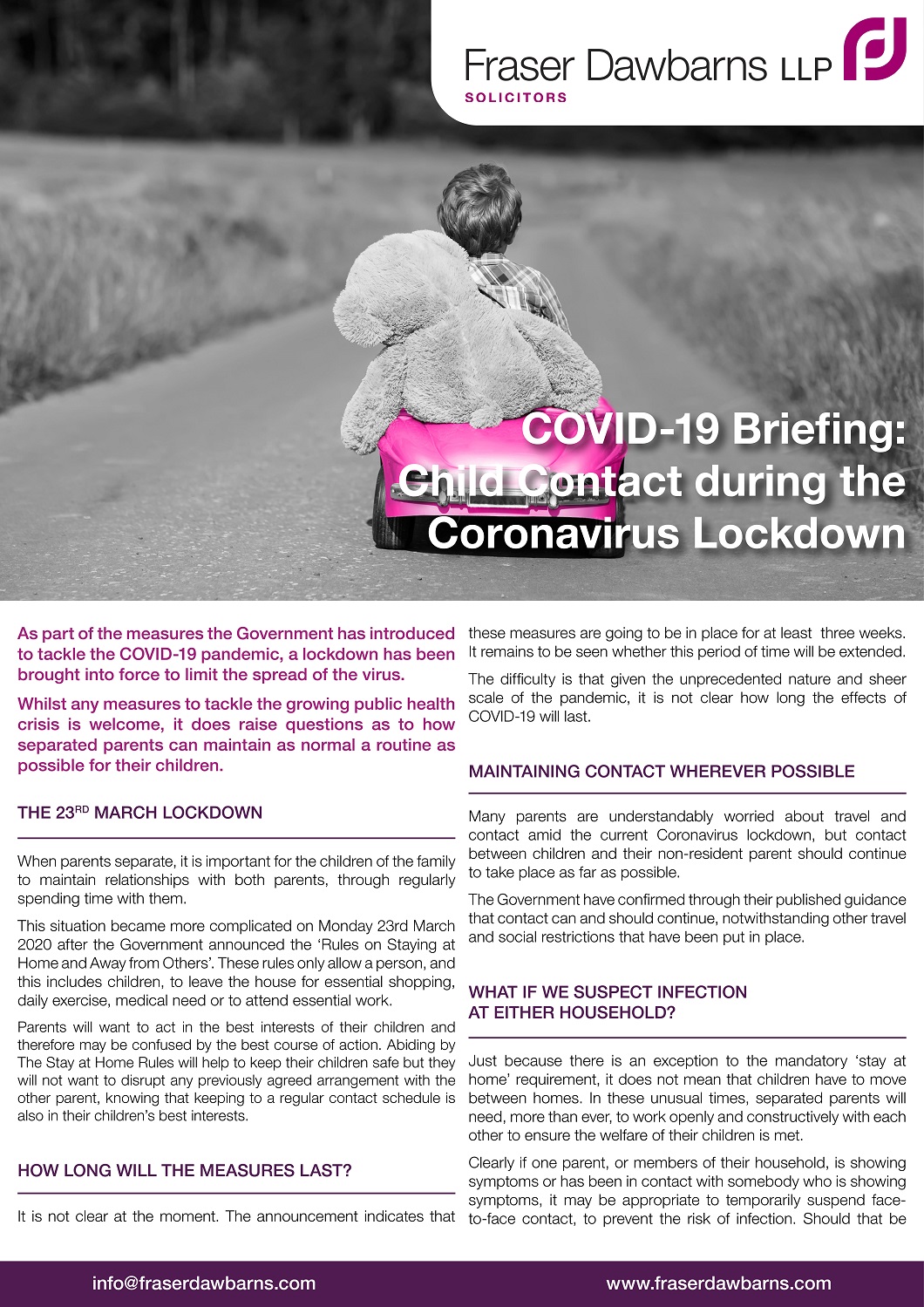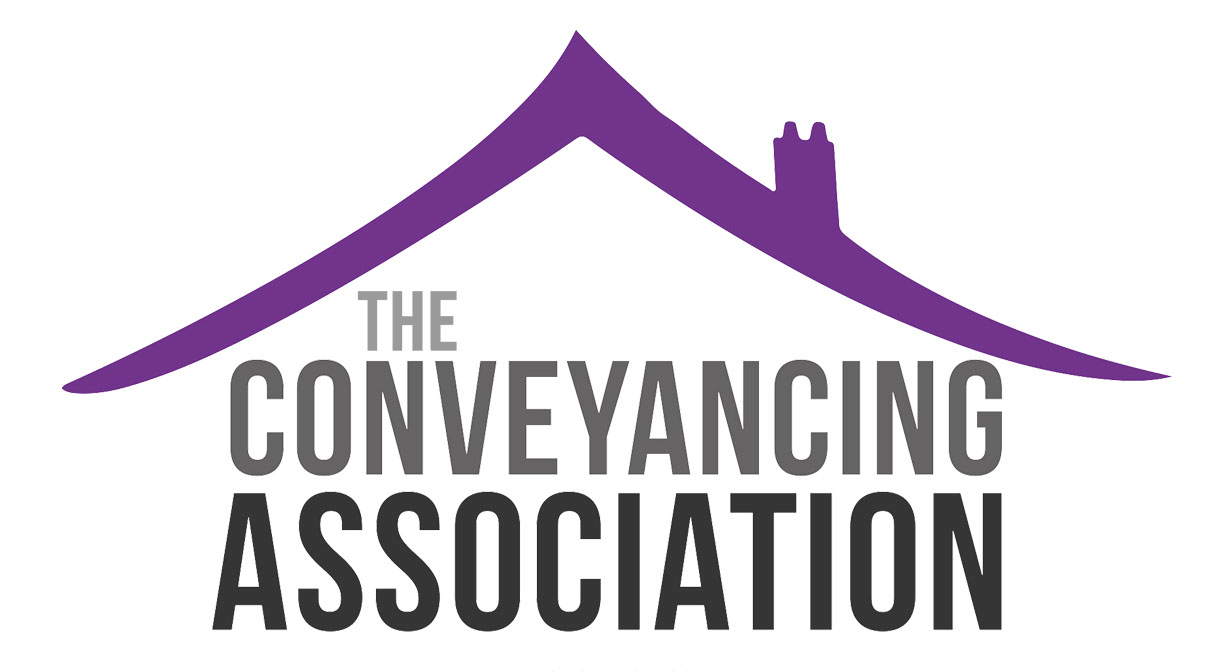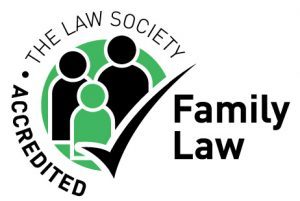COVID-19 Briefing: Child Contact During The Coronavirus Lockdown
As part of the measures the Government has introduced to tackle the COVID-19 pandemic, a lockdown has been brought into force to limit the spread of the virus. Whilst any measures to tackle the growing public health crisis is welcome, it does raise questions as to how separated parents can maintain as normal a routine as possible for their children.
The 23rd March Lockdown
When parents separate, it is important for the children of the family to maintain relationships with both parents, through regularly spending time with them. This situation became more complicated on Monday 23rd March 2020 after the Government announced the ‘Rules on Staying at Home and Away from Others’. These rules only allow a person, and this includes children, to leave the house for essential shopping, daily exercise, medical need or to attend essential work.
Parents will want to act in the best interests of their children and therefore may be confused by the best course of action. Abiding by The Stay at Home Rules will help to keep their children safe but they will not want to disrupt any previously agreed arrangement with the other parent, knowing that keeping to a regular contact schedule is also in their children’s best interests.
How Long Will The Measures Last?
It is not clear at the moment. The announcement indicates that these measures are going to be in place for at least three weeks. It remains to be seen whether this period of time will be extended. The difficulty is that given the unprecedented nature and sheer scale of the pandemic, it is not clear how long the effects of COVID-19 will last.
Maintaining Contact Wherever Possible
Many parents are understandably worried about travel and contact amid the current Coronavirus lockdown, but contact between children and their non-resident parent should continue to take place as far as possible. The Government have confirmed through their published guidance that contact can and should continue, notwithstanding other travel and social restrictions that have been put in place.
What If We Suspect Infection At Either Household?
Just because there is an exception to the mandatory ‘stay at home’ requirement, it does not mean that children have to move between homes. In these unusual times, separated parents will need, more than ever, to work openly and constructively with each other to ensure the welfare of their children is met.
Clearly if one parent, or members of their household, is showing symptoms or has been in contact with somebody who is showing symptoms, it may be appropriate to temporarily suspend face-to-face contact, to prevent the risk of infection. Should that be necessary, it will be important to ‘make up for this’, through regular and meaningful telephone calls and sessions on video chat apps such as Facetime and Skype.
The key message is that, in circumstances where Coronavirus restrictions cause the letter of a court order to be varied, the spirit of the order should still be upheld by both parents making safe alternative arrangements for the children.
Working Together In The Best Interests Of Your Children
Provided both parents and the children are safe and well, however, and showing no symptoms, direct contact can continue to take place. Parents should discuss arrangements such as travel and handover in advance, in order to take all necessary precautions, and ensure that everyone in their household continues to wash their hands and avoid social interaction. Review and sensible discussion should enable parents to make the best of these unusual circumstances, and facilitate continued contact for their children.
Peace of Mind through difficult times
In uncertain times, the only thing we can say for certain is that nothing will stay the same for long.
It is entirely possible, therefore, that new legislation will have been introduced which will mean that all or part of this briefing no longer reflects the current law.
Because of this, we ask you to consider that, although correct at time of printing, information in this sheet may no longer be up to date and it is always best practice to consult with a lawyer about anything contained in this briefing.
Our lawyers are available to help answer any of your questions about this or any other legal concern you have.
Please contact Fraser Dawbarns directly for up-to-date information on your specific circumstances.
This Guide was prepared on 30th March 2020
New laws are being introduced and current legislation is regularly being updated. Although every effort has been made to ensure that information contained in this sheet is accurate, it may no longer be current at the time of reading. We strongly recommend consulting with a lawyer about your specific circumstances.
Read our Other COVID-19 Briefings
Our COVID-19 Guides contain useful information on how the coronavirus pandemic and the lockdown have affected legal services and everyday life across the UK.
- Extension to Stay on Residential Posessions
- Could an LPA Have Helped Me During the Lockdown?
- Dispute Resolution During the Pandemic
- Force Majeure and Frustration
- Coronavirus and Business Interruption Insurance
- Winding Down the Furlough Scheme
- Child Maintenance on a Reduced Income
- Reopening the Housing Market
- Life After Furlough
- The Changing Face of Litigation
- Holding Company Meetings During Lockdown
- Recovering Debts While Under Lockdown
- Making or Amending a Will Under Lockdown
- Commercial Lasting Powers of Attorney
- The Three Month Ban on Evicting Tenants
- Commercial Tenancies and Rights of Forfeiture
- Guidance for Employers and Employees
Related Articles
Recommended By The Legal 500 Directory*
*We are recommended for the following practice areas: Corporate and Commercial, Debt Recovery, Employment, Personal Injury: Claimant, Agriculture and Estates, Contentious Trusts and Probate, Family, Personal Tax, Trusts and Probate & Commercial Property.
ServicesContact

















